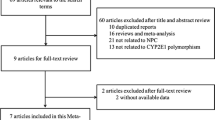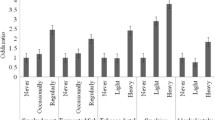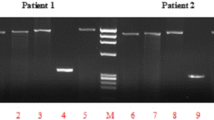Abstract
Background
Nasopharyngeal carcinoma (NPC) is a rare tumor in most parts of the world but occurs at relatively high frequency among people of Chinese descent. The cytochrome P450 2E1 enzyme (CYP2E1) is responsible for the metabolic activation of nitrosamines, and has been shown to be a susceptibility gene for NPC development in Taiwan [RR = 2.6; 95%CI = 1.2-5.7]. Since there has been only one report of this link, it was decided to investigate the susceptibility of CYP2E1 to NPC development in other populations. Therefore, the correlation between the RsaI polymorphism of this gene and NPC was studied in-patients including Thai and Chinese in Thailand. The present study comprised 217 cases diagnosed with NPC and 297 healthy controls.
Results
Similar to the result found in Taiwanese, a homozygous uncut genotype demonstrated a higher relative risk both when all cases were analyzed [RR = 2.19; 95%CI = 0.62-8.68] or individual racial groups, Thai [RR = 1.51; 95%CI = 0.08-90.06] or Chinese [RR = 1.99; 95%CI = 0.39-10.87]. The ethnicity-adjusted odds ratio is 2.39 with 95%CI, 0.72-7.89.
Conclusions
Though our finding was not statistically significant due to the moderate sample size of the study, similarity to the study in Taiwan with only a slight loss in precision was demonstrated. The higher RR found for the same genotype in distinct populations confirmed that CYP2E1 is one of several NPC susceptibility genes and that the RsaI minus variant is one mutation that affects phenotype.

Similar content being viewed by others
References
Parkin DM, Muir CS: Cancer Incidence in Five Continents: Comparability and quality of data. IARC Sci Publ. 1992, 120: 45-173.
Simons MJ, Wee GB, Singh D, Dharmalingham S, Yong NK, Chau JC, Ho JH, Day NE, De The G: Immunogenetic aspects of nasopharyngeal carcinoma. V. Confirmation of a Chinese-related HLA profile (A2, Singapore 2) associated with an increased risk in Chinese for nasopharyngeal carcinoma. Natl Cancer Inst Monogr. 1977, 47: 147-51.
Cui HY: Apparent correlation between nasopharyngeal carcinoma and HLA phenotype. Chung Hua Chung Liu Tsa Chih. 1982, 4(4): 249-53.
Chan SH: Aetiology of nasopharyngeal carcinoma. Ann Acad Med Singapore. 1990, 19(2): 201-7.
Zhu XN, Chen R, Kong FH, Liu W: Human leukocyte antigens -A, -B, -C, and -DR and nasopharyngeal carcinoma in northern China. Ann Otol Rhinol Laryngol. 1990, 99(4 Pt 1): 286-7.
Muir CS: Nasopharyngeal carcinoma in non-Chinese populations with special reference to south-east Asia and Africa. Int J Cancer. 1971, 15: 351-63.
Choi PH, Suen MW, Huang DP, Lo KW, Lee JC: Nasopharyngeal carcinoma: genetic changes, Epstein-Barr virus infection, or both. A clinical and molecular study of 36 patients. Cancer. 1993, 15: 2873-8.
Hildesheim A, Levine PH: Etiology of nasopharyngeal carcinoma: a review. Epidemiol. 1993, 15(2): 466-85.
Zheng YM, Tuppin P, Hubert A, Jeannel D, Pan YJ, Zeng Y, de The G: Environmental and dietary risk factors for nasopharyngeal carcinoma: a case-control study in Zangwu County, Guangxi, China. Br JCancer. 1994, 69(3): 508-14.
Hildesheim A, Chen CJ, Caporaso NE, Cheng YJ, Hoover RN, Hsu MM, Levine PH, Chen IH, Chen JY, Yang CS, et al: Cytochrome P4502E1 genetic polymorphisms and risk of nasopharyngeal carcinoma: results from a case-control study conducted in Taiwan. Cancer Epidemiol Biomarkers Prev. 1995, 4(6): 607-10.
Hildesheim A, Anderson LM, Chen CJ, Cheng YJ, Brinton LA, Daly AK, Reed CD, Chen IH, Caporaso NE, Hsu MM, et al: CYP2E1 genetic polymorphisms and risk of nasopharyngeal carcinoma in Taiwan. J Natl Cancer Inst. 1997, 20;89(16): 1207-12. 10.1093/jnci/89.16.1207.
Nebert DW: Role of genetics and drug metabolism in human cancer risk. Mutat Res. 1991, 247(2): 267-81.
Poulsen HE, Loft S, Wassermann K: Cancer risk related to genetic polymorphisms in carcinogen metabolism and DNA repair. Pharmacol Toxicol. 1993, 72 Suppl 1: 93-103.
Bartsch H, Montesano R: Relevance of nitrosamines to human cancer. Carcinogenesis. 1984, 5(11): 1381-93.
Gervasi PG, Longo V, Naldi F, Panattoni G, Ursino FX: enobiotic-metabolizing enzymes in human respiratory nasal mucosa. Biochem Pharmacol. 1991, 15;41(2): 177-84. 10.1016/0006-2952(91)90474-J.
Poirier S, Bouvier G, Malaveille C, Ohshima H, Shao YM, Hubert A, Zeng Y, de The G, Bartsch H: Volatile nitrosamine levels and genotoxicity of food samples from high-risk areas for nasopharyngeal carcinoma before and after nitrosation. Int J Cancer. 1989, 5;44(6): 1088-94.
Hayashi S, Watanabe J, Kawajiri K: Genetic polymorphisms in the 5'-flanking region change transcriptional regulation of the human cytochrome P450IIE1 gene. J Biochem (Tokyo). 1991, 110(4): 559-65.
Bruce RK: Human Genetics: A problem-Based Approach. Massachusetts: Blackwell Science. 1999
Pre-publication history
The pre-publication history for this paper can be accessed here:http://www.biomedcentral.com/content/backmatter/1471-2407-1-4-b1.pdf
Acknowledgments
We deeply indebted to the staff of the Department of Otolaryngology and the Radiotherapy Section, Department of Radiology, Chulalongkorn Hospital and National Blood Center for the recruitment of patients and collection of materials. This work was supported by Molecular Biology Project, Faculty of Medicine, Chulalongkorn University and the Thailand research Fund.
Competing interests
None declared
Author information
Authors and Affiliations
Corresponding author
Authors’ original submitted files for images
Below are the links to the authors’ original submitted files for images.
Rights and permissions
About this article
Cite this article
Kongruttanachok, N., Sukdikul, S., Setavarin, S. et al. Cytochrome P450 2E1 polymorphism and nasopharyngeal carcinoma development in Thailand: a correlative study. BMC Cancer 1, 4 (2001). https://doi.org/10.1186/1471-2407-1-4
Received:
Accepted:
Published:
DOI: https://doi.org/10.1186/1471-2407-1-4




